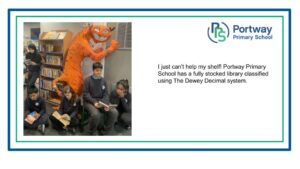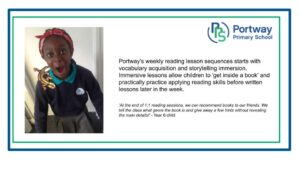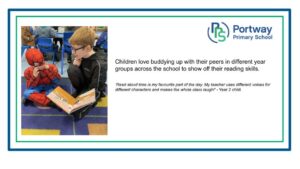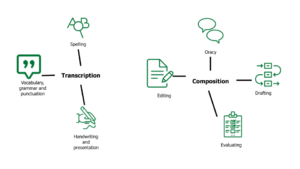English
The English curriculum has been designed so that pupils are taught how to speak and write fluently so that that they can communicate their ideas and emotions to others and through their reading and listening, others can communicate with them.
Pupils are exposed to a range of engaging and challenging texts and develop a love literature and read for enjoyment- at Portway Primary we are all avid readers! The curriculum also ensures that all pupils develop all the skills of language which are essential not only in order to access the rest of the curriculum but also to participate fully as a member of society and ultimately impact on their future life chances.
You can learn more about what we cover in our reading programme and our writing programme.
How is English taught at Portway?
The English curriculum is designed to help pupils form an English mental model within their long-term memories.
Mental Model theory states that all knowledge is organised into units. A mental model is, therefore, a conceptual system for understanding knowledge.
Our English mental model is a way of organising English substantive and disciplinary knowledge in a meaningful way; it is an appreciation of how facts are connected and the ways in which they are connected. It is distinct from information, which is just isolated facts that have no organisational basis or links.
Big Ideas help form the basis of the mental model. Big Ideas are key concepts that underpin the subject. There are three Big Ideas in English:
- Reading
- Writing
- Commucation
Each Big Idea has knowledge strands which help to strengthen the mental model. Learning knowledge in each of the strands allows pupils to express and demonstrate their understanding of the Big Idea.
The Big Idea of Reading
Pupils are taught to decode and have speedy recognition of familiar words builds on their learning from the school’s teaching of early reading. Link to Early Reading Programme. Developing pupils’ comprehension skills happens through ensuring the pupils, over the course of a term, read widely across a range of texts and respond to these texts. This allows pupils to increase their vocabulary because they encounter words they would rarely hear or use in everyday speech and to develop knowledge of the world in which they live in. In addition, reading tasks and carefully planned questioning helps develop the pupils’ ability to answer literal comprehension as well as being able to read for meaning and show an appreciation of reading.
To further promote pleasure for reading, the school has a fantastic library which is accessible to all pupils. The library contains a diverse range of books which are updated annually. Literacy and other subject lessons are planned to make use of the library and opportunities are available for pupils to use the library in their spare time. Reading buddies, library parent and pupil open evenings and lunch time library club are a few examples of how the library is used to enhance the pupils’ enjoyment of reading.



The Big Idea of Writing
Writing at Portway helps develop pupils’ competencies in two key areas- transcription (spelling and handwriting) and composition (articulating ideas and structuring them in speech and writing). Carefully planned, regular writing opportunities also allow the pupils to develop their writing stamina, ensuring all pupils can write at length. Every week the pupils are given the opportunity to write an extended piece for a range of real purposes and audiences and to practise specific transcription and composition skills.
The pupils are given opportunities to develop their ability to think aloud, explore and collect ideas, draft and re-read their writing as it forms. Pupils are also taught the importance of proof-reading and monitoring their own writing to make sure it is effective. Each year, pupils embark on a several whole school writing projects. The outcomes of these projects celebrate progression in writing across the school.
The Big Idea of Communicating
Spoken language underpins the development of reading and writing. The quality and variety of language that the pupils hear and speak are vital for developing their vocabulary and grammar and their understanding for reading and writing. Pupils are provided with opportunities to develop their spoken language though meaningful talk opportunities such as whole-class debates, partner work, group work, reading aloud for performance or fluency and drama based activities.
English across the curriculum
Pupils get to rehearse, apply and consolidate their learning in all other areas of the curriculum. Careful planning ensures pupils continue developing all areas of English in other subjects.

